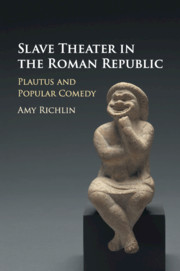Crossref Citations
This Book has been
cited by the following publications. This list is generated based on data provided by Crossref.
Barbiero, Emilia A.
2018.
MYTH, LETTERS AND THE POETICS OF ANCESTRY IN PLAUTUS'BACCHIDES.
Ramus,
Vol. 47,
Issue. 1,
p.
2.
Čulik-Baird, Hannah
2019.
STAGING ROMAN SLAVERY IN THE SECOND CENTURY BCE.
Ramus,
Vol. 48,
Issue. 2,
p.
174.
Dinter, Martin T.
2019.
The Cambridge Companion to Roman Comedy.
Brown, Peter
2019.
WERE THERE SLAVES IN THE AUDIENCE OF PLAUTUS’ COMEDIES?.
The Classical Quarterly,
Vol. 69,
Issue. 2,
p.
654.
Hanses, Mathias
2019.
He Licks the Dish but Does Not Taste the Ham: A Grouping of Pompeian Wall Writings and Its Engagement with Elegy and Roman Comedy.
Illinois Classical Studies,
Vol. 44,
Issue. 1,
p.
42.
Franko, George Fredric
and
Dutsch, Dorota
2020.
A Companion to Plautus.
p.
1.
Gildenhard, Ingo
and
Viglietti, Cristiano
2020.
Roman Frugality.
p.
1.
Clackson, James
James, Patrick
McDonald, Katherine
Tagliapietra, Livia
and
Zair, Nicholas
2020.
Migration, Mobility and Language Contact in and around the Ancient Mediterranean.
Dinter, Martin T.
2020.
A Companion to Plautus.
p.
269.
Huemoeller, Katharine P. D.
2020.
Freedom in Marriage? Manumission for Marriage in the Roman World.
Journal of Roman Studies,
Vol. 110,
Issue. ,
p.
123.
Stürner, Ferdinand
2020.
A Companion to Plautus.
p.
135.
Gildenhard, Ingo
2020.
Roman Frugality.
p.
237.
Daniel, Clara
2020.
Hic et nunc: Amy Richlin's Iran Man and the ethics of translating Plautus.
Theatralia,
p.
143.
Witzke, Serena S.
2020.
A Companion to Plautus.
p.
331.
Tatum, James
2020.
A Companion to Plautus.
p.
473.
Barrios‐Lech, Peter
2020.
A Companion to Plautus.
p.
221.
Hanses, Mathias
2020.
Men among Monuments: Roman Topography and Roman Memory in Plautus’Curculio.
Classical Philology,
Vol. 115,
Issue. 4,
p.
630.
Richlin, Amy
2020.
A Companion to Plautus.
p.
347.
Lape, Susan
2021.
MOBILITY AND SEXUAL LABORERS IN MENANDER'SDIS EXAPATONAND PLAUTUS’BACCHIDES.
Ramus,
Vol. 50,
Issue. 1-2,
p.
25.
Revermann, Martin
2021.
Brecht and Tragedy.



